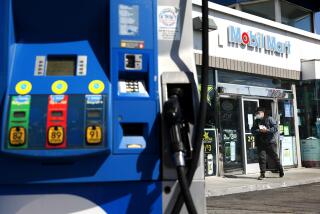Alaska Faces Painful Changes as Oil Income Shrinks
- Share via
JUNEAU, Alaska — Alaska has lived comfortably off the riches of its oil for more than a decade. But prices and production are declining, and the state faces a potential $1-billion budget deficit next year.
Lawmakers are discussing what they considered unmentionable only a few months ago: reinstituting the state income tax and phasing out Alaska’s annual oil-money giveaway.
Nobody expects the Legislature will take those politically unpopular steps this election year. But economists say they must be done by the mid-1990s.
The changes will be immense for a state that has no state income or sales taxes, yet spends more per resident than any other state.
“We’ve gotten used to getting a lot from government and not having to pay for it,” said Scott Goldsmith, an economics professor at the University of Alaska. “To change that is not going to happen overnight.”
The income tax was repealed as a result of the oil boom in the late 1970s and early 1980s, which flooded the treasury with tax and royalty money.
“We had so much oil revenue that it seemed silly to tax people,” said state Sen. Pat Pourchot, a Democrat and co-chairman of the Senate Finance Committee. “Why drain people’s pockets needlessly?”
Oil taxes and royalties fund about 85% of the state budget and each Alaskan, regardless of need, receives an annual share of earnings from the Permanent Fund, a $13.4-billion oil-wealth trust.
Last year’s “dividend” was $931 for every man, woman and child. Residents 65 and older get an additional $250 monthly.
Smaller booms have come and gone with fluctuating oil prices. Sixteen months ago, Alaska was anticipating a possible billion-dollar windfall from a surge in prices driven by the Persian Gulf War.
But prices dropped unexpectedly once fighting began, and Alaska’s surplus amounted to only $500 million. It was enough to avoid budget cuts for one more year, but this year appears different.
In December, Gov. Walter J. Hickel proposed a $2.48-billion state budget for the fiscal year beginning July 1. It was based on $18.90-a-barrel oil, but North Slope crude has since fallen to the $15 to $16 range.
If Hickel’s budget were adopted and oil prices remained flat, the state would find itself up to $1 billion in the red by July, 1993.
To close that gap, lawmakers are likely to dip into reserves, raise fees for state services, raise the gasoline tax, and make major budget cuts.
“It’s not going to be some mythical line-item called ‘fat in the budget,’ ” Pourchot said. “It’s going to be real stuff.”
But even if prices climb back to $20 or higher, Alaska faces an even greater fiscal crisis in the next few years.
Production from Prudhoe Bay, North America’s largest oil field, has declined steadily since 1987’s peak of 572.3 million barrels. Last year’s production was 465.4 million barrels.
The state estimates that production will fall 5% to 7% a year, to 250.7 million barrels by the end of this decade.
University of Alaska economists say the Legislature should develop a long-range plan that would reinstitute the income tax, phase out the Permanent Fund dividend, cap spending, and establish a “transition fund” to cover short-term deficits caused by oil price slumps.
One source of money to do that could be the Permanent Fund, which has received 20% of the state’s oil revenues since 1977. But the state Constitution forbids spending the fund principal, and many Alaskans believe the dividends should only be given out directly to residents.
“The debate has to begin again as to how the public sees that fund,” said Republican Sen. Arliss Sturgulewski.
The economists also said the state needs to encourage new development, including oil exploration in the Arctic National Wildlife Refuge.
So far, however, Congress has been unwilling to open the refuge, and most other resource development projects face growing opposition from environmentalists.
“The outlook’s pretty gloomy,” Republican Rep. Ramona Barnes said. “Any new projects take so long to develop that our only hope is to discover new fields at Prudhoe Bay to keep oil going through the pipeline.”
More to Read
Sign up for Essential California
The most important California stories and recommendations in your inbox every morning.
You may occasionally receive promotional content from the Los Angeles Times.













